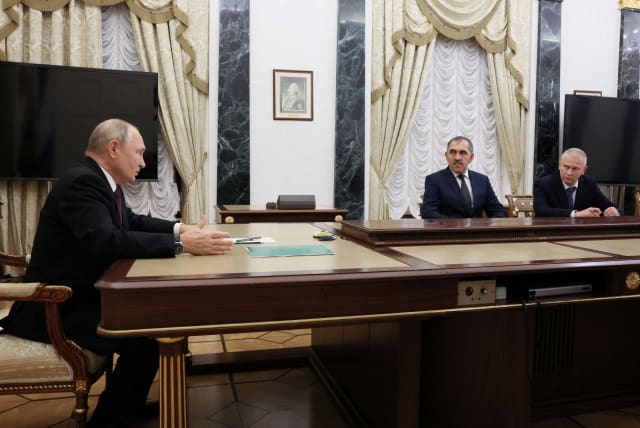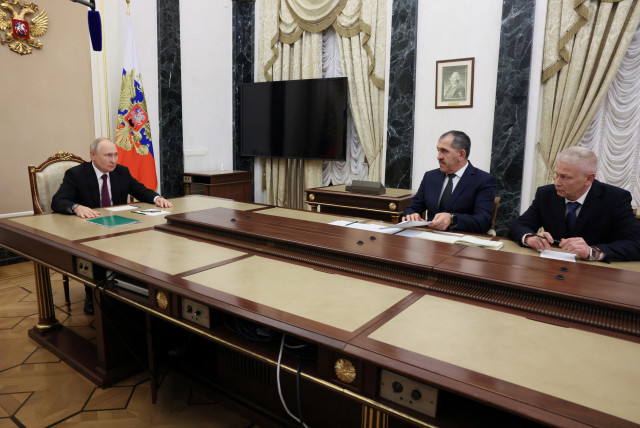After Putin meeting, is Russia's Wagner back to fight in Ukraine? - explainer

Putin's Kremlin meeting with Wagner's Troshev, who now works for the defense ministry, is a major hint that Wagner fighters - if not the group itself - are returning to the war.
Russian President Vladimir Putin was on Friday shown meeting one of the most senior former commanders of the Wagner mercenary group, Andrei Troshev, and discussing how best to use "volunteer units" in the Ukraine war.
Is Wagner back, who controls it and are its fighters returning to the Ukraine war?
What is Wagner?
Wagner, one of the world's most battle-hardened mercenary groups, was founded by Yevgeny Prigozhin and Dmitry Utkin, a former special forces officer in Russia's GRU military intelligence.
Cast as a private army, Wagner enabled Russia to dabble in wars in countries including Syria, Libya and Mali with deniability. Opponents such as the United States cast Wagner as a brutal crime group which plundered African states and meted out sledehammer deaths to those who challenged it.
Wagner also fought in Ukraine and took the city of Bakhmut in May after the bloodiest battle of the war. After the fall of Bakhmut, Wagner fighters were withdrawn from the front.
At its peak, Wagner had tens of thousands of men - at least 50,000 convicts were offered their freedom if they survived the battles in Ukraine - and tens of thousands of Russian volunteers, including many former special forces troops.
Salaries were high and Prigozhin said the command structure was responsible and lacked the bureaucracy of the Russian army.
But Prigozhin, angered by what he said was the stupidity and incompetence of Russia's top military brass, took control of the military headquarters of the southern city of Rostov and then marched on Moscow in a June 23-24 mutiny.
Putin initially said he would crush the mutiny, comparing it to the wartime turmoil that ushered in the revolutions of 1917, but hours later a deal was clinched to defuse the situation. The full details of the deal are still unclear.
What has happened since?
After Putin cast the mutineers as traitors, Wagner and Prigozhin came under attack by the Russian state. Police raided Wagner properties and state television said Prigozhin's operations had received nearly $20 billion from the state.
The Kremlin looked for a way to bring the group's fighters under control without losing the fighting capability of Wagner, which itself was riven by disputes over its future and who should lead it.
On Aug. 23, the private jet on which Prigozhin and Utkin were traveling to St Petersburg crashed north of Moscow killing all 10 people on board.
After Prigozhin's death, Putin ordered Wagner fighters to sign an oath of allegiance to the Russian state - a step that Prigozhin had opposed due to his anger at the defense ministry that he said risked losing the Ukraine war.
Russian sources told Reuters that some of the group's fighters have signed contracts with the defense ministry, though many more have joined a variety of different Russian private military groups.
Unconfirmed Russian reports said that Anton Yelizarov, known by the call sign "Lotus," had been appointed commander of Wagner. Yelizarov, a former deputy of Utkin, commanded the storming of Bakhmut.
Besides Ukraine, Yelizarov saw action in Syria, Central African Republic and Mali. While Prigozhin criticized Russian Defense Minister Sergei Shoigu, Yelizarov said Shoigu was "out of control" and seeking to destroy Wagner.
But it is unclear who within the Russian state is directing Wagner - and how far Wagner can keep operating abroad in places such as Syria, Libya, Central African Republic and Mali.
Back in the war?
Putin's Kremlin meeting with Wagner's Troshev, who now works for the defense ministry, is a major hint that Wagner fighters - if not the group itself - are returning to the war.
Addressing Troshev, Putin said: "You know what it is, how it is done, you know about the issues that need to be resolved in advance so that the combat work goes in the best and most successful way."
The meeting is also an indicator that Deputy Defense Minister Yunus-Bek Yevkurov, who attended, and Troshev will coordinate the work of Wagner fighters.
Russian, Ukrainian and Western sources have indicated that Wagner fighters are returning to the front.
British military intelligence said that up to hundreds of fighters formerly associated with Wagner have likely started to redeploy to Ukraine as part of a variety of different units.
"The exact status of the redeploying personnel is unclear, but it is likely individuals have transferred to parts of the official Russian Ministry of Defense forces and other PMCs," British military intelligence said.
Russian war blog Rybar, which has over 1.2 million subscribers, said that Wagner fighters would return to Bakhmut.
"The first units of the PMC began to return to Bakhmut to conduct a counteroffensive against previously lost positions," Rybar said.
Jerusalem Post Store
`; document.getElementById("linkPremium").innerHTML = cont; var divWithLink = document.getElementById("premium-link"); if (divWithLink !== null && divWithLink !== 'undefined') { divWithLink.style.border = "solid 1px #cb0f3e"; divWithLink.style.textAlign = "center"; divWithLink.style.marginBottom = "15px"; divWithLink.style.marginTop = "15px"; divWithLink.style.width = "100%"; divWithLink.style.backgroundColor = "#122952"; divWithLink.style.color = "#ffffff"; divWithLink.style.lineHeight = "1.5"; } } (function (v, i) { });

